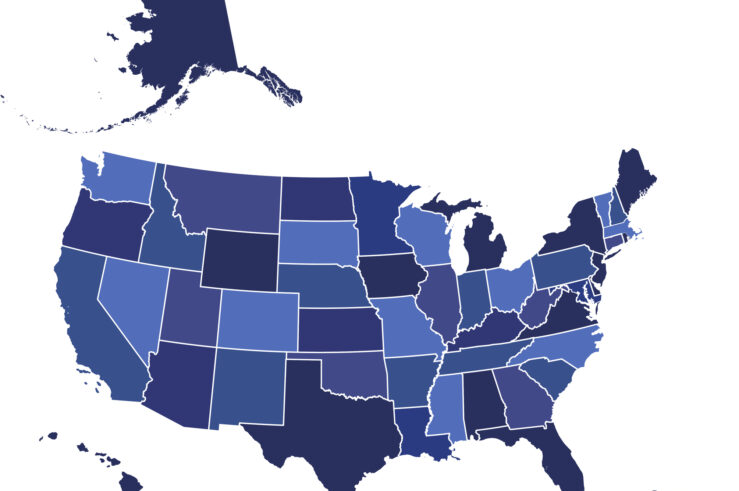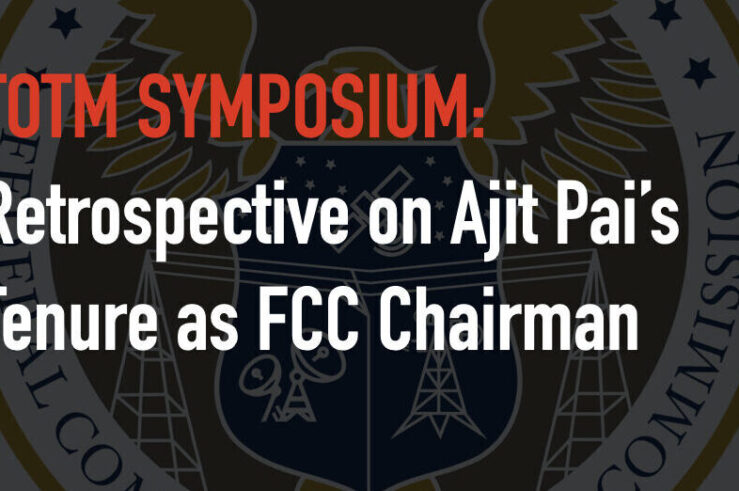Showing archive for: “Spectrum & Wireless”
Two FCC Commissioners Walk Into a Bar
Former FCC Commissioners Have Some Thoughts Writing with Kirk Arner in RealClearMarkets, Harold Furchtgott-Roth—formerly of the Federal Communications Commission (FCC)—comments on the Spectrum Auction Reauthorization Act, recently passed out of the House Energy and Commerce Committee. Arner and Furchtgott-Roth note that reauthorizing spectrum auctions is a “good and necessary idea,” but take issue with the “$23 billion Ponzi ... Two FCC Commissioners Walk Into a Bar
FCC Auctions and the Benefits of Unlicensed Spectrum
What should a government do when it owns geese that lay golden eggs? Should it sell the geese to fund government programs? Or should it let them run wild so everyone can have a chance at a golden egg? That’s the question facing Congress as it considers re-authorizing the Federal Communications Commission’s (FCC’s) authority to ... FCC Auctions and the Benefits of Unlicensed Spectrum
To Close the Digital Divide, Broadband Infrastructure Funds Must Be Spent Efficiently
States seeking broadband-deployment grants under the federal Broadband Equity, Access, and Deployment (BEAD) program created by last year’s infrastructure bill now have some guidance as to what will be required of them, with the National Telecommunications and Information Administration (NTIA) issuing details last week in a new notice of funding opportunity (NOFO). All things considered, ... To Close the Digital Divide, Broadband Infrastructure Funds Must Be Spent Efficiently
What is the Appropriate Role for State Antitrust Enforcement?
In the U.S. system of dual federal and state sovereigns, a normative analysis reveals principles that could guide state antitrust-enforcement priorities, to promote complementarity in federal and state antitrust policy, and thereby advance consumer welfare. Discussion Positive analysis reveals that state antitrust enforcement is a firmly entrenched feature of American antitrust policy. The U.S. Supreme ... What is the Appropriate Role for State Antitrust Enforcement?
The Contestable Platform Paradox
Why do digital industries routinely lead to one company having a very large share of the market (at least if one defines markets narrowly)? To anyone familiar with competition policy discussions, the answer might seem obvious: network effects, scale-related economies, and other barriers to entry lead to winner-take-all dynamics in platform industries. Accordingly, it is ... The Contestable Platform Paradox
ITSA Foreshadows Final Act in 5.9GHz Fight
It’s a telecom tale as old as time: industry gets a prime slice of radio spectrum and falls in love with it, only to take it for granted. Then, faced with the reapportionment of that spectrum, it proceeds to fight tooth and nail (and law firm) to maintain the status quo. In that way, the ... ITSA Foreshadows Final Act in 5.9GHz Fight
Antitrust Lessons from AT&T’s M&A Fiasco
The chorus of condemnation continued with vigor even after the DOJ’s loss in court and AT&T’s consummation of the transaction. With AT&T’s May 17 announcement that it will unwind the two-year-old acquisition and therefore abandon its strategy to integrate content and distribution, it is clear these predictions of impending market dominance were unfounded. This widely ... Antitrust Lessons from AT&T’s M&A Fiasco
The FTC Did Not ‘Fumble the Future’ in Its Google Search Investigation
Politico has released a cache of confidential Federal Trade Commission (FTC) documents in connection with a series of articles on the commission’s antitrust probe into Google Search a decade ago. The headline of the first piece in the series argues the FTC “fumbled the future” by failing to follow through on staff recommendations to pursue ... The FTC Did Not ‘Fumble the Future’ in Its Google Search Investigation
Investors and Regulators Can Both Fall for Platform Bubbles
In current discussions of technology markets, few words are heard more often than “platform.” Initial public offering (IPO) prospectuses use “platform” to describe a service that is bound to dominate a digital market. Antitrust regulators use “platform” to describe a service that dominates a digital market or threatens to do so. In either case, “platform” denotes power ... Investors and Regulators Can Both Fall for Platform Bubbles
How FTC v. Qualcomm Led to the Nvidia-Arm Acquisition
In a constructive development, the Federal Trade Commission has joined its British counterpart in investigating Nvidia’s proposed $40 billion acquisition of chip designer Arm, a subsidiary of Softbank. Arm provides the technological blueprints for wireless communications devices and, subject to a royalty fee, makes those crown-jewel assets available to all interested firms. Notwithstanding Nvidia’s stated ... How FTC v. Qualcomm Led to the Nvidia-Arm Acquisition
Chairman Pai Symposium: Wrap-Up and Thoughts for the Future FCC
One of the themes that has run throughout this symposium has been that, throughout his tenure as both a commissioner and as chairman, Ajit Pai has brought consistency and careful analysis to the Federal Communications Commission (McDowell, Wright). The reflections offered by the various authors in this symposium make one thing clear: the next administration ... Chairman Pai Symposium: Wrap-Up and Thoughts for the Future FCC
The Ajit Pai FCC on Radio Spectrum Allocations
Disclosure: The one time I met Ajit Pai was when he presented a comment on my book, “The Political Spectrum,” at a Cato Institute forum in 2018. He was gracious, thorough, and complimentary. He said that while he had enjoyed the volume, he hoped not to appear in upcoming editions. I took that to imply ... The Ajit Pai FCC on Radio Spectrum Allocations













